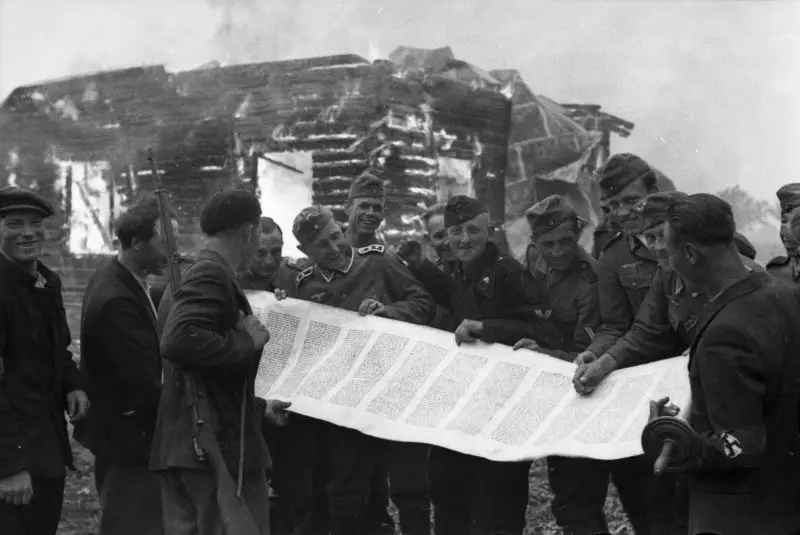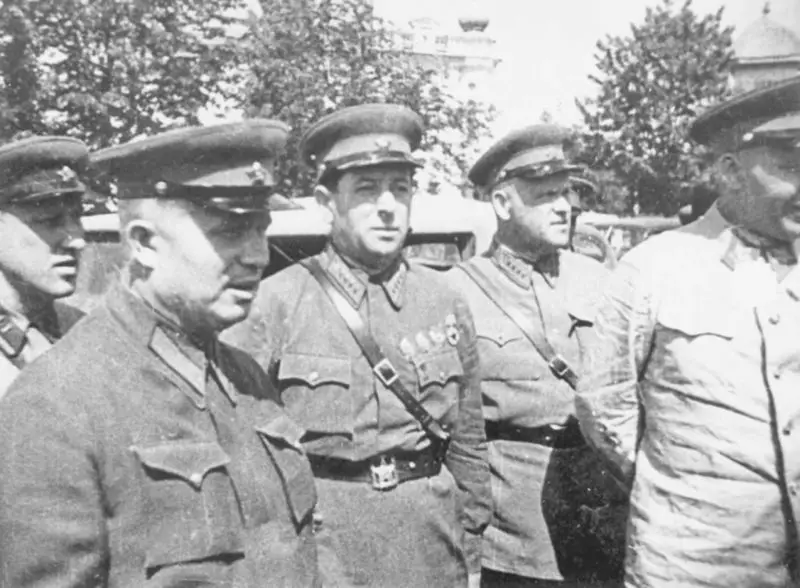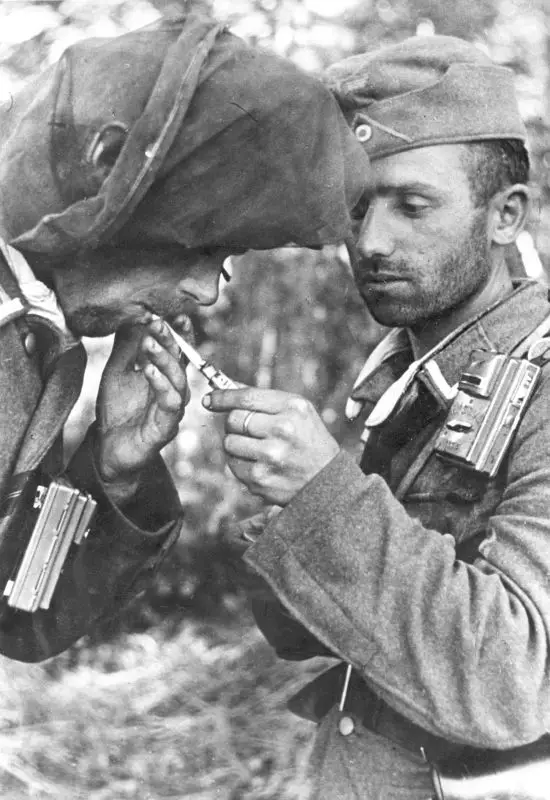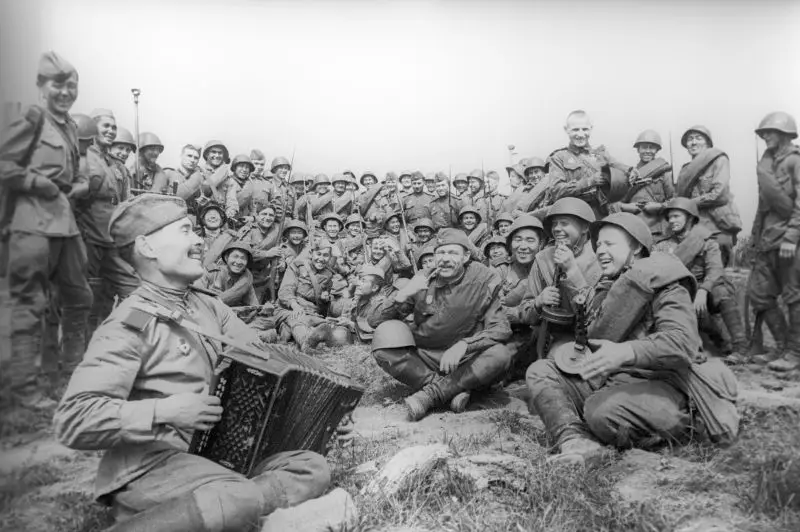“The mixed national composition of divisions creates enormous difficulties”

Wehrmacht soldiers and Lithuanian police with a Torah scroll against the backdrop of a burning synagogue... 1941
The revival of “great power Russian chauvinism”
In 1937–1938 With a new world war approaching, Stalin is trying to return the state to its traditional policy, which is especially noticeable in the field of military development and the fight against heterogeneous fifth columns.
One of the important directions was the introduction of compulsory study of the Russian language in schools of the national republics (How Ukrainization and Indigenization of the Red Army Failed), with the simultaneous Russification of the territories of the Baltic states, Western Ukraine and Bessarabia returned to Russia. This was largely due to the modernization, industrialization and urbanization of the USSR. The Russian language has become the language of a new technological structure.
However, precious time and resources that had previously been spent on the indigenization and development of national cultures, language, writing and the intelligentsia, and were now required for the full Russification of the national Ukrainian outskirts, were lost. Plus the inertia of the previous national policy and the resistance of part of the “Leninist Guard” and local nomenclatures. Old party leaders, for example, N.K. Krupskaya, greeted the renaissance of “Great Russian chauvinism” with hostility.
Therefore, the excesses of the national policy of the 1920s affected the overall defense capability and development of the country for a long time. Thus, in May 1940, the People's Commissar of Defense of the USSR, Marshal S.K. Timoshenko reported to the Soviet leadership on the results of conscription of all citizens of military age into the army:
A high price had to be paid for the policy of indigenization in education and culture and for the fight against “Great Russian chauvinism” already during the Great Patriotic War.

Army Commissar 1st Rank L.Z. Mehlis and N.S. Khrushchev in Bessarabia. 1940
War and a new attempt to create national formations
In the USSR, official propaganda and historiography tried to hide a number of unpleasant facts and insisted that the war showed the strength of Soviet internationalism. They tried to forget about the mistakes of national policy, which in turn led to new “excesses” in favor of the national outskirts at the expense of the Great Russian provinces and regions and the Russian people during the reign of Khrushchev and Brezhnev. And then the development of nationalism and separatism among the leadership and intelligentsia of the national republics became one of the most important prerequisites for the collapse of the entire USSR.
The test of war showed the depth of the problem associated with national policy and nation-military construction of the 1920s and early 1930s. Heavy losses of the army personnel in the first period of the war, the need for widespread use of all possible human resources to compensate for heavy losses, forced Moscow to resort to mass army and labor mobilization of Soviet citizens, including the republics of the North and South Caucasus, Central Asia.
At the same time, in 1941–1942. in severe crisis conditions, attempts were made to form national military units. They, thanks to the homogeneity of the national composition and the seeming absence of the problem of team coherence due to the diversity of linguistic and ethnic composition, were called upon to make up for the enormous losses of the Red Army.
Thus, on November 13, 1941, a resolution was adopted by the State Defense Committee (GKO) on the formation of national military formations from among the rank and file and command personnel of local nationalities in the national republics of the RSFSR (Bashkir, Kalmyk, Chechen-Ingush and Kabardino-Balkarian) and in the republics of Central Asia. In total, it was planned to form 19 cavalry divisions and 15 rifle brigades.
However, it soon became clear that the conscription of significant contingents from among local residents and the formation of national formations not only did not solve the problem of manpower reserve for the army and rear, but, on the contrary, created new serious problems. Such units were distinguished by low combat effectiveness and discipline; they had a high percentage of “self-inflicted gunshots”, deserters, flight from the battlefield and defection to the enemy.
The command faced the same problems when many conscripts from the Caucasus and Central Asia ended up in regular personnel units. Official documents from the front of the period 1941–1942. filled with such messages.
Thus, in a memorandum from the head of the group of agitators of GlavPURRKKA Stavsky to the deputy head of GlavPURRKKA I.V. Shishkin on the results of a trip to the Transcaucasian Front (December 4, 1942), it was noted that even the command and political composition of the front believes that “cadres of non-Russian nationality do not know how and do not they want to fight, they say that they don’t know Russian. And they have two Russian words that you only hear from them: “I am a ballroom” or “kursak (stomach) hurts.”
The commanders did not want to take local natives into their units, preferring Russians, Ukrainians and Belarusians.
“I won’t take anyone but Russians”
Another example is related to the fighting in Crimea in the winter and spring of 1942. Arriving at the Crimean (until January 28 - Caucasian) front on January 20, 1942 as a representative of the Headquarters of the Supreme High Command, the head of the Main Political Directorate (GlavPUR) of the Red Army, Lev Mehlis, immediately became concerned about replenishing the front with personnel. He drew attention to the national composition of the arriving reinforcements. On January 24, he was promised a reinforcement of 15 thousand Russians.
Mehlis noted: “Here the replenishment comes exclusively from Transcaucasian nationalities. Such a mixed national composition of divisions creates enormous difficulties.” And he asked “to give reinforcements that are Russian and trained, because they will immediately go to work.”
On February 16, having requested several divisions from the North Caucasus Military District to organize a new offensive in Crimea, Mehlis directly demanded that the district commander, General V. Kurdyumov, clear the units of “Caucasians” (the expression of the Headquarters representative himself) and replace them with military personnel of Russian nationality.
Such sentiments reigned among ordinary Red Army soldiers.
The famous Soviet poet Boris Slutsky, who in 1942 was an instructor, and from 1943 - a senior instructor in the political department of the 57th division, noted:
There were many problems: complete ignorance of the Russian language, representatives of small nations did not understand commanders and colleagues; some tribes did not have a militaryhistorical traditions, the soldier's craft were new to them; It was difficult for residents of villages and auls in the new war of machines; there was no corresponding urban, industrial culture; For many nomads and mountaineers from the south, it was difficult in the forests and swamps of the Russian central zone and the north.
Plus low motivation, many natives of the Caucasus or Central Asia did not see this war, which was going on in the west of the country, as a threat to their families and tribes. Therefore, conscripts from national republics easily deserted, avoided battle, or went over to the enemy’s side.
Slutsky wrote:
The companies composed of them resembled the army of Genghis or Timur... and the commanders of the companies were planters and martyrs at the same time, overseers of the construction of the Tower of Babel the day after the confusion of languages. The officers refused to accept the nationalists.”
Boris Slutsky recalled that at first everyone admired the mountaineers, who accurately shot at a coin on a branch, but when the real war began with losses, their mood changed dramatically. Self-inflicted gunfire, desertions, refusal to go into battle, requests to return them home, etc. began.
On the front line they did not want to see not only natives of auls and villages, but also Poles, Estonians, Latvians, because of their nationalism. The same Balts in the territories occupied by the Germans en masse joined punitive police battalions and exterminated Jews and Russians.
Thus, by removing the Soviet propaganda of “fraternal internationalism”, one can understand the real picture. The creation of a personnel mass army from all nationalities of the USSR led to the fact that Russians became closely acquainted en masse with representatives of other peoples and tribes of the country. And this acquaintance did not make a very favorable impression on the Russians, as did the assessment of the fighting and moral qualities of the national people.
It was obvious that The national outskirts need to be Russified for more than one generation, to introduce urban, industrial civilization. As small inclusions, representatives of small nations did not violate their combat capability. But there should have been a majority of Russians in the division (70-80%), as in the country as a whole, they were the core of the state and army.

German soldiers light a cigarette on the Soviet-German front. Presumably these are soldiers of the Georgian Wehrmacht Legion. Summer 1943
Battle of the Caucasus
The defense of the Caucasus (July 25 – December 31, 1942) also showed the error of the course towards the formation of national units. Here the party and military leadership decided to form military units and formations from natives of the republics of the North Caucasus and Transcaucasia, hoping that they would defend their native land.
There were human reserves in Georgia, Armenia and Azerbaijan, but local residents did not know Russian well. Therefore, it was decided to form national units. 9 national divisions were formed - Georgian, Azerbaijani and Armenian.
The result was more than disastrous.
The head of the political department of the Northern Group of Forces of the Transcaucasian Front, brigade commissar Nadorshchin, reported to the head of the Glavpur Shcherbakov:
Two national divisions - the 89th Armenian and the 223rd Azerbaijani - due to their combat training and the political and moral state of the personnel, were recognized as unfit for combat and were relegated to the second echelon.”
The 223rd Division began to fall apart right on the march, without even entering the battle. The soldiers deserted alone and in groups, carrying away weapon. The 89th Division, in a minor collision with the enemy, showed complete incapacity for combat and lost many people, equipment and weapons. In the first battle, many platoon, company and battalion commanders lost control of their units. Many fighters fled, more than 400 people went over to the enemy’s side.
A similar situation was in the 392nd Georgian division. Where in just 4 days – October 9–13, 117 people went over to the enemy’s side.
The ineffectiveness of the national divisions caused a conflict between the Military Council of the Transcaucasian Front (ZF) and the Military Council of the 44th Army, and the Military Council of the Northern Group of Forces of the Polar Front, which these divisions were part of.
The commander of the Northern Group of Forces, Lieutenant General I. Maslennikov, who was also the Deputy People's Commissar of Internal Affairs, twice spoke to the country's leadership with a proposal to reorganize the Armenian and Azerbaijani divisions as uncombat-ready and unstable into rifle brigades with a reduction in personnel of at least half.
True, there was some political correctness; the Georgian divisions, which also fought unsatisfactorily, were not remembered.
As a result, the commanders and political workers of the Red Army had to make titanic efforts and use various methods of persuasion to force Red Army soldiers from small nations to go into battle.

The orderly of the sanitary company of the 23rd Guards Rifle Regiment of the 8th Guards Rifle Division of the 22nd Army of the North-Western Front of the Guard, Red Army soldier Ramazan Erzhanovich Elebaev (1910–1943), performs his songs in front of the guardsmen of the 4th Rifle Company, in which the legendary 28 fought Panfilov heroes. June 1943
Ramazan Elebaev, a Kazakh composer, a student at the Moscow State Institute of Theater Arts named after A.V. Lunacharsky, after the outbreak of the Great Patriotic War, interrupted his studies and went to the front. During his service, he continued his creativity, including writing the songs “March of the Talgar Regiment”, “Song of the 28 Batyrs”, “March of the 23rd Regiment”, “Young Kazakh” (dedicated to his friend, Hero of the Soviet Union Tolegen Tokhtarov, who fell in battle) .
In February 1943, under heavy enemy mortar and machine gun fire, Ramazan Elebaev carried 42 wounded soldiers and commanders with their weapons from the battlefield, for this feat he was awarded the Order of the Red Banner on May 22, 1943.
Killed in battle on November 4, 1943 near the village of Arshakhino, Kalinin (modern Pskov) region.
To be continued ...
Information